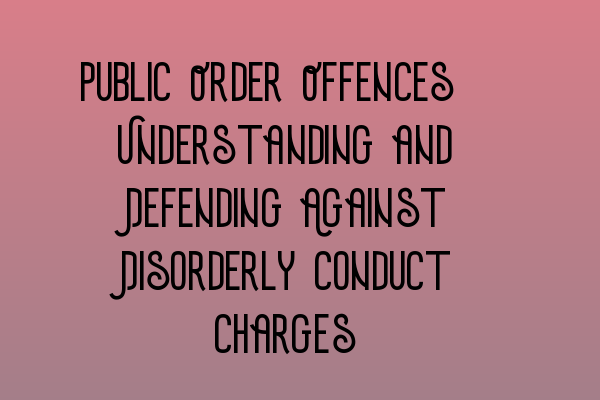Public Order Offences: Understanding and Defending Against Disorderly Conduct Charges
Public order offences, such as disorderly conduct, can have serious consequences for individuals. If you find yourself facing disorderly conduct charges, it is important to understand the nature of the offence and how you can mount a strong defense. In this article, we will explore the key aspects of disorderly conduct charges and provide valuable insights into how to defend against them.
What is Disorderly Conduct?
Disorderly conduct is a public order offence that involves engaging in behavior that is likely to cause harassment, alarm, or distress to others. The specific actions that constitute disorderly conduct can vary depending on the jurisdiction, but common examples include:
- Using threatening or abusive language
- Engaging in violent behavior
- Causing excessive noise
- Intentionally obstructing public areas
Individuals charged with disorderly conduct may face penalties such as fines, community service, or even imprisonment. The severity of the punishment depends on factors such as the nature of the conduct, the defendant’s criminal history, and the impact on others.
Understanding Defenses Against Disorderly Conduct Charges
When facing disorderly conduct charges, it is crucial to have a strong defense strategy. Here are some key defenses that can be used in such cases:
- Misidentification: If there is a lack of evidence linking you to the alleged disorderly conduct, you can argue that you have been misidentified. This defense can be particularly effective if there are multiple witnesses who contradict each other.
- Freedom of Speech: In some cases, disorderly conduct charges can infringe upon your right to free speech. If your actions are protected by freedom of speech laws, you can argue that the charges are unfounded.
- Self-defense: If you were engaged in disorderly conduct as a form of self-defense, you may be able to argue that your actions were justified. However, it is important to demonstrate that your level of response was proportionate to the threat you faced.
- Mental Incapacity: If you have a mental health condition that affected your ability to understand the consequences of your actions, you may be able to seek a defense based on mental incapacity. This defense requires expert testimony to support your claim.
It is important to consult with an experienced criminal defense solicitor to determine the most suitable defense strategy based on the specifics of your case.
Consulting a Criminal Defense Solicitor
When facing disorderly conduct charges or any other public order offence, it is essential to seek legal advice from a reputable criminal defense solicitor. A skilled solicitor with expertise in public order offences can provide you with the necessary guidance to navigate the legal process and build a strong defense.
At SQE Criminal Law & Practice Law UK, our team of experienced solicitors is well-versed in defending against disorderly conduct charges. We understand the complexities of these cases and work diligently to protect the rights and interests of our clients.
If you need expert legal representation for your disorderly conduct case, contact us today to schedule a consultation with one of our skilled solicitors.
Conclusion
Public order offences can have serious consequences, and disorderly conduct charges should not be taken lightly. By understanding the nature of the offence and working with an experienced criminal defense solicitor, you can effectively defend yourself against these charges.
For more information on related legal topics, feel free to explore the following articles:
- LLC Formation Made Simple: Step-by-Step Guide for UK Entrepreneurs
- LLC Formation: A Step-by-Step Guide for UK Entrepreneurs
- Business Regulations in the UK: A Comprehensive Overview
- Decoding Corporate Structures: A Comprehensive Legal Insight
